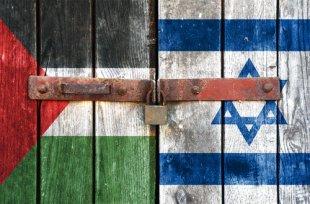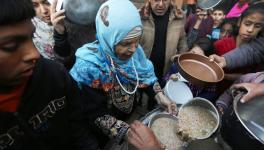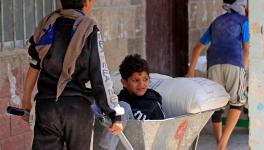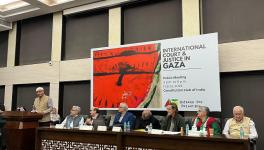The Palestinian Hunger Strike Continues as Trump Prepares for His Israel Visit

Photo Credit: Borislav Bajkic/Shutterstock
Today, over 1,000 Palestinian political prisoners entered the 25th day of their hunger strike. Mahatma Gandhi’s longest hunger strike went on for 21 days. Bobby Sands, the Irish nationalist, died on the 66th day of his strike. In 2011, Palestinian political prisoner Khader Adnan went on hunger strike, but ended it on the 66th day.
Three years later, Adnan went on hunger strike when he was re-arrested. Israel’s Minister of Public Security, Gilad Erdan, said at the time, "Security prisoners are interested in turning hunger strikes into a new kind of suicide attack that would threaten the State of Israel. We cannot allow anyone to threaten us and we will not allow prisoners to die in our prisons." The example of Bobby Sands lingers. He galvanized Irish nationalist politics with his death in 1981. Force-feeding is discouraged by the Israeli courts, but it is on the agenda for Erdan.
Media coverage of the strike has been pathetic. For the first two weeks of this historic strike, there was almost no substantial coverage. Few media outlets detailed the demands of the strikers, which are along the grain of international law and common sense (my report on the strike from April 25 carries some of these details). The long list can be boiled down to four important issues.
-
That the Israeli prison authorities allow family visits for the prisoners, including the allowance for family members to take photographs. Only two 45-minute visits are permitted per month, although family members from Gaza and parts of the West Bank have been denied permits to come to the prisons.
-
That the prisoners have adequate access to medical care. The Israeli Ministry of Health does not administer the health of the prisoners. That is left to the Ministry of Internal Security, which has an incentive to use medical care as part of its discipline regime against the prisoners.
-
That the Mandela Rules on solitary confinement be adopted, so that prisoners are not placed in solitary for more than 15 days. The Israeli prisons are not shy of saying that there are at least 63 prisoners who have been in solitary confinement for over six months.
-
That the Israeli government ends the policy of administrative detention, by which at least 688 prisoners have been held indefinitely without any charge or judicial oversight.
None of these elementary demands are taken seriously. Instead, the hunger strike came into the news when the Israeli government accused one of the leaders of the strike of breaking his fast. Marwan Barghouti, widely recognized as the leader of the prisoners and one of the most admired people in Fatah, initiated the strike. The Israelis have released a video showing a man purportedly eating cookies and a candy bar on two occasions. It is impossible to verify the video or even to make out what the man is doing or whether it is Marwan Barghouti.
In his May 7 press conference, Gilad Erdan claimed Barghouti "is a murderer and hypocrite who urged his fellow prisoners to strike and suffer while he ate behind their back." Barghouti’s wife, Fadwa, said Israel is "resorting to despicable acts." The footage, she said, may have been from 2004. "It is not surprising what the occupation did and the fabrications they have tried to spread," she said. "Such an act has unveiled the ugly face of the Israeli occupation." The head of the Palestinian Prisoners’ Club, Qadoura Fares, said the video is plainly a fabrication.
Erdan’s allegations have had little impact on the Palestinian struggle. A general strike in the West Bank on April 27 closed down cities such as Ramallah. Palestinian activists say they have not seen such a sense of unity for at least two decades. Near the illegal settlement of Bet El, Palestinian youth created a mural of Marwan Barghouti’s face out of broken glass. There is an echo here from Mahmoud Darwish’s brilliant poem "Beirut," which honors the Palestinian fighters. "Do you know the dead?" the poet asks, and answers, "They will be born beneath the trees,/They will be born under the rain,/They will be born from stone,/They will be born from broken glass...."
The health of the prisoners in this Freedom and Dignity strike deteriorates rapidly. The Palestinian Committee on Prisoners’ Affairs said that the prisoners report spells of dizziness, severe pain and weight loss. A press release from the Committee on May 9 says, "The Israeli Prison Service carry out inspection raids every day using police dogs, and they spill water on prisoners instead of giving them water to drink."
A window into the prisoners’ situation can be gleaned from a letter smuggled out of Ashkelon Prison to the Asra Media Office in Gaza. It is written by Muhammad al-Qiq, a Palestinian journalist who had been on hunger strike in 2016 for 94 days. Al-Qiq reports that he has lost six kilograms, but that he is in good spirits. "Once they have made up their minds to face the occupier with their empty stomachs," wrote al-Qiq, "heroic prisoners will have the final word."
Attempts to reach Marwan Barghouti have failed. He remains in solitary confinement. Yousef Jabareen, a member of the Israeli Knesset from the Joint Arab List, attempted to see Barghouti, but was denied by the prison services. In the past few weeks, the Israeli authorities have thrice denied Jabareen’s right to see Barghouti. The Israel Prison Services’ "rejection of all my requests to visit Barghouti constitutes a serious harm to my political activity as a Knesset member and to parliamentary immunity," Jabareen said. "There is no doubt that the prisoners’ strike is of utmost public importance and that it is my role as an elected public official to examine and scrutinize Israel Prison Services policies related to this issue. This is done by, amongst other means, visiting prisoners."
Jabareen and Muna Haddad, a lawyer from Adalah (Legal Center for Arab Minority Rights in Israel), wrote again to the prison authorities on May 5 for allowance to see Barghouti. It is likely that they will be denied.
In two weeks, Donald Trump will arrive in Israel. The outcome of this hunger strike will determine the mood on the streets. If a prisoner dies, it will provoke great anger among the Palestinian population. Checkpoint killings, such as that of Fatima Afif Abd al-Rahman (age 16), are an indication of the deep frustration in the population. This hunger strike, like previous hunger strikes, unifies the Palestinian population, which has been fragmented by the occupation and by the fractious politics of its various parties. The open sore of this occupation is on display as 1,500 prisoners refuse to eat. Their demands are attainable. But that the Israelis will not even discuss them reveals the intractable nature of the occupation. This is what Trump will have to confront.
Disclaimer: The views expressed here are the author's personal views, and do not necessarily represent the views of Newsclick.
Get the latest reports & analysis with people's perspective on Protests, movements & deep analytical videos, discussions of the current affairs in your Telegram app. Subscribe to NewsClick's Telegram channel & get Real-Time updates on stories, as they get published on our website.
























